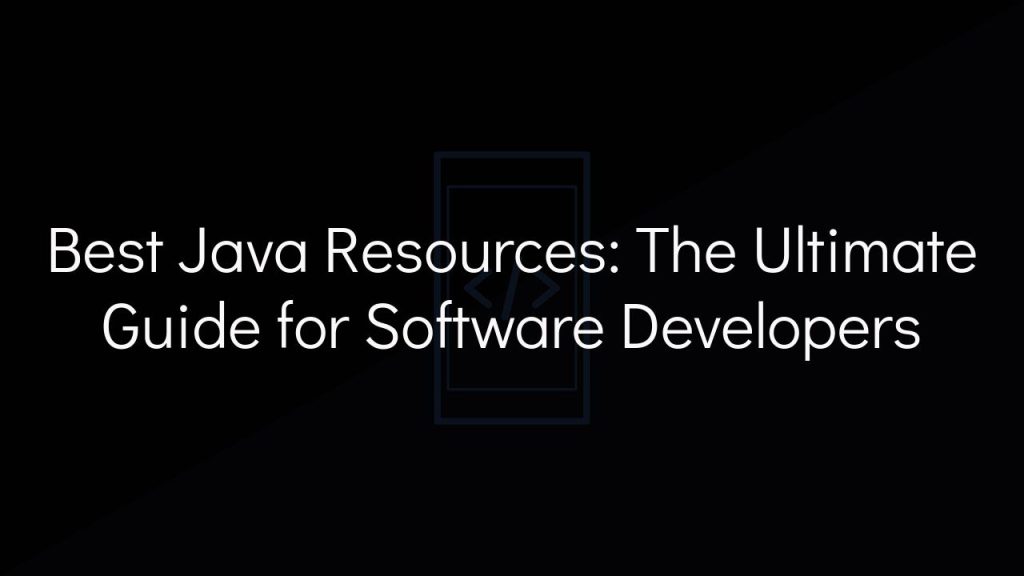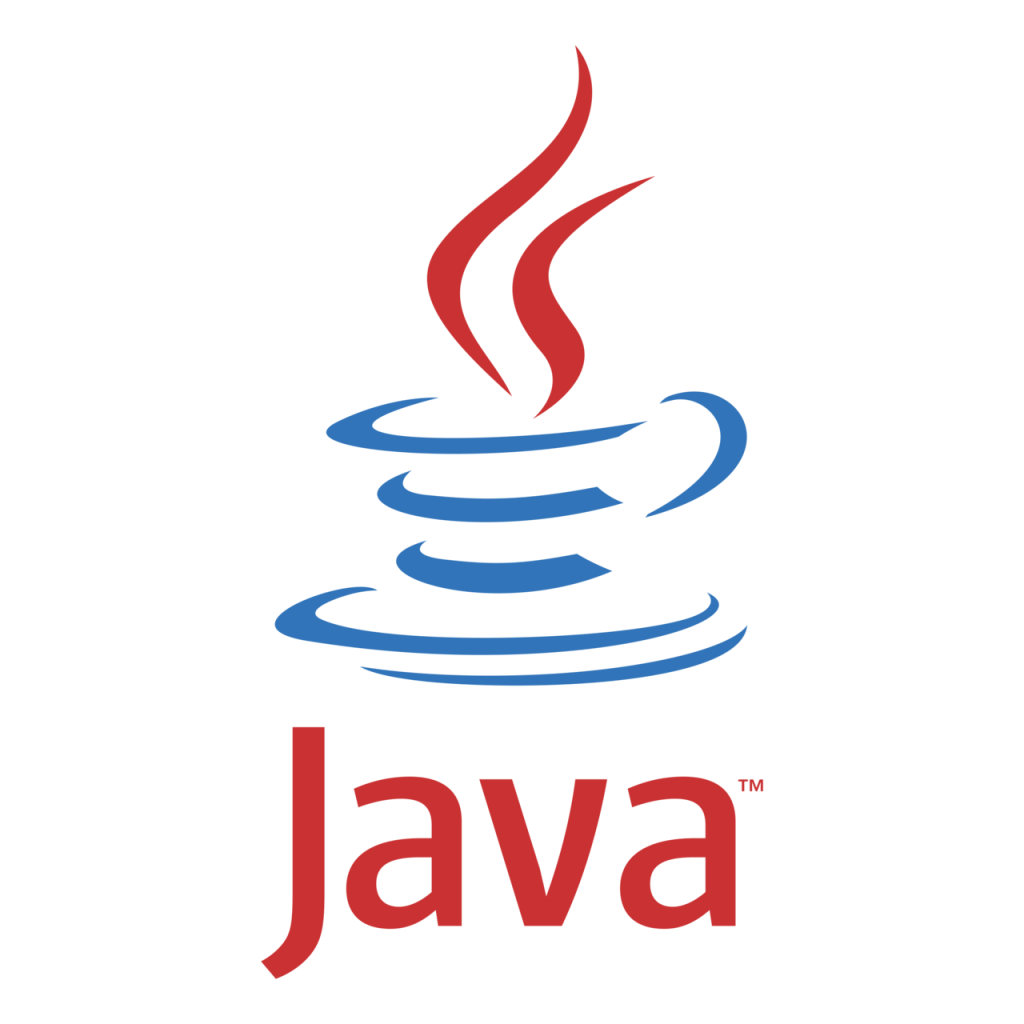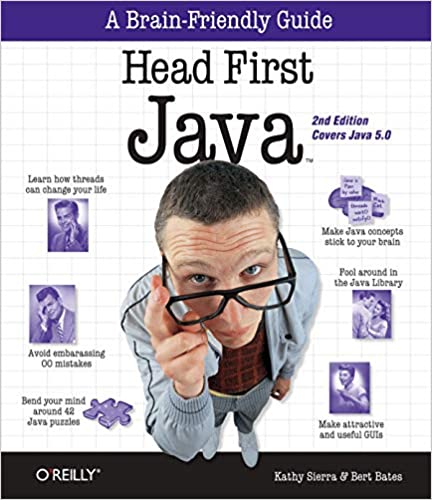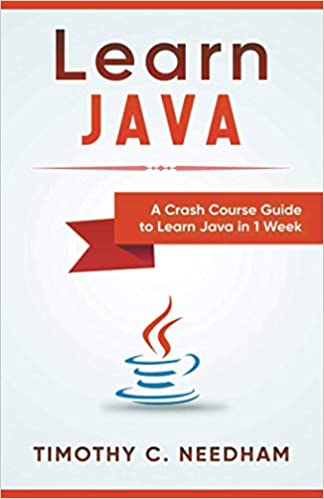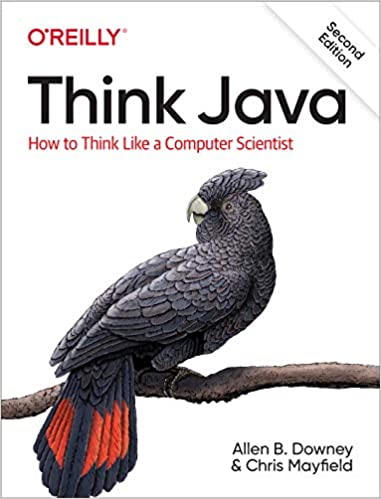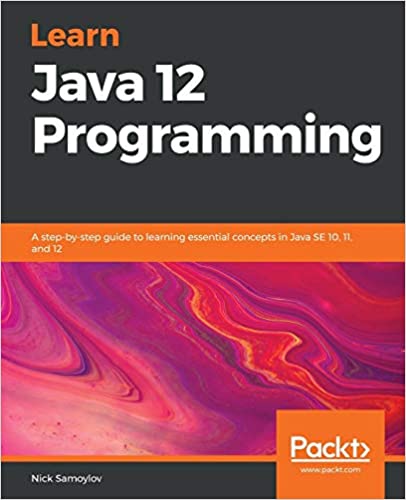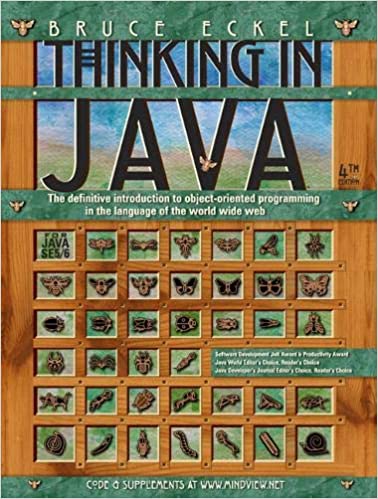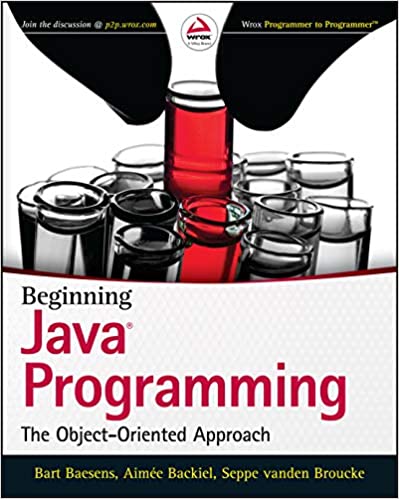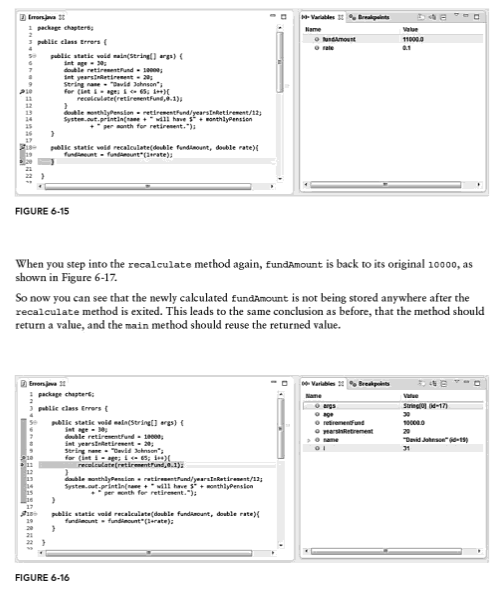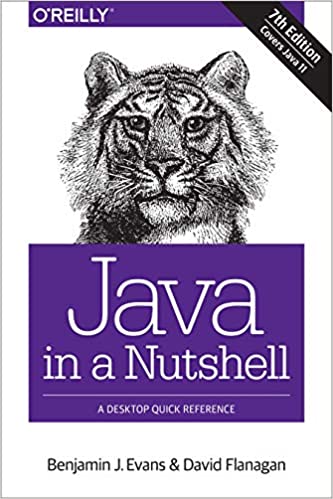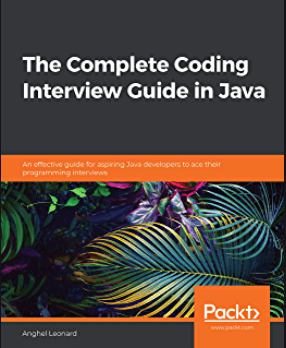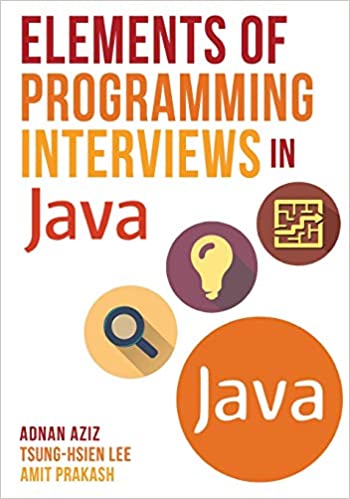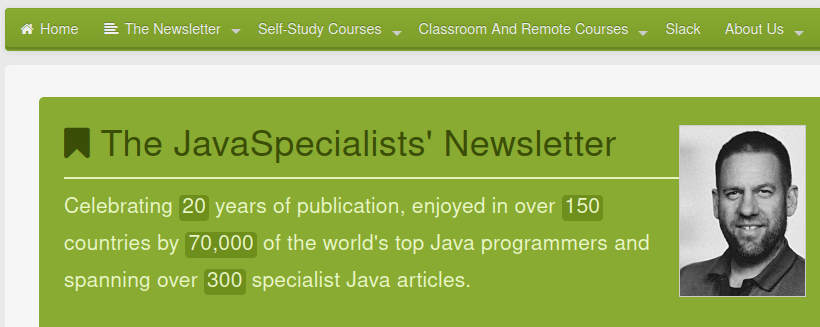Table of Contents
Did you know that there are literally 5.5 billion devices that use Java?
And with over 9 million Java developers across the globe, you’ve got some competition.
But never fear. We put together a list of ultimate Java resources for this year.
So whether you’re a code newbie or are preparing for that coding interview, we’ve got something for Java developers of all levels.
Today we’re looking at:
- courses
- books
- blogs
- podcasts
- newsletters
- YouTube channels
And a miscellaneous resource.
This post contains affiliate links. I may receive compensation if you buy something. Read my disclosure for more details.
TLDR: Best Java Resources
We picked some of our favorite Java resources:
🔥 Course 🔥
Learn Java from Scratch: Educative.io
🚨 Book 🚨
Head First Java, 2nd Edition
💥 Blog 💥
Baeldung
📻 Podcast 📻
Java Off-Heap
📰 Newsletter 📰
The JavaSpecialists’ Newsletter
📺 YouTube Channel 📺
Java Programming All-in-One Tutorial Series: Caleb Curry
BEST JAVA RESOURCES
Strap in and check out the best Java resources we could find.
💥 JAVA COURSES
Here are some of the best Java resources out there: beginner and intermediate Java courses.
Learn Java from Scratch: Educative.io
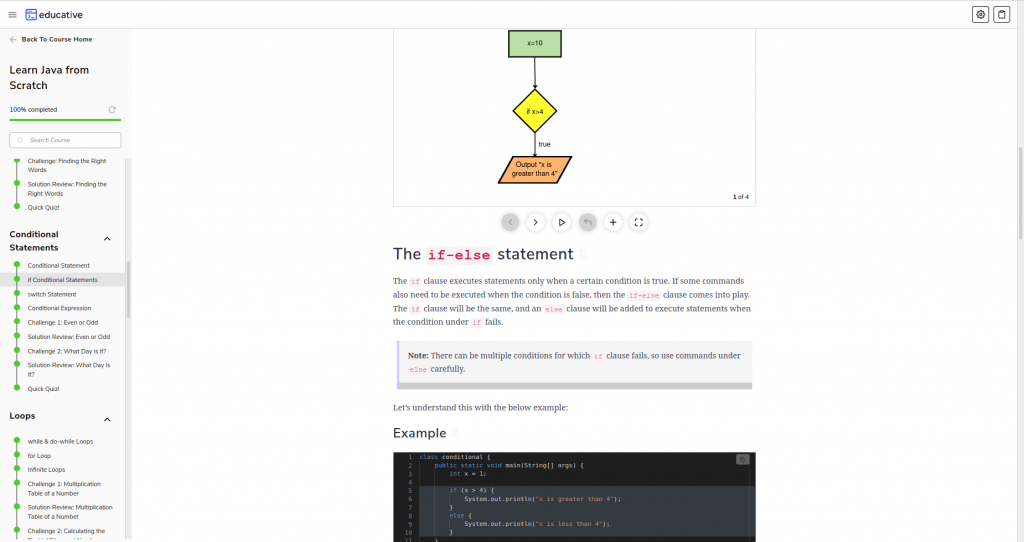
| 24 Challenges | 86 Coding Playgrounds | 11 Quizzes | 101 Illustrations |
Learn Java from Scratch is a course on Educative.io geared towards absolute code newbies.
You’ll start with the most basic of all programs: “Hello, World.”
But then you’ll go on to work on things like:
- conditional statements
- loops
- logic in Java
After that, you’ll examine some more advanced Java concepts such as generics and inheritance.
At the completion of the course, you’ll level up to an intermediate Java developer.
Educative.io is an interactive learning platform. So instead of watching videos, you’ll work within the same browser using coding playgrounds and exercises.
Projects
You won’t work on projects. Rather, you’ll work on a series of challenges throughout the course.
Community
There’s no official community on Educative.io. However, there’s student support in each course where you can ask questions and get help from instructors and other students.
💰 Price: Free to audit / $59 per month or $199 per year ($16.66 per month) for access to all courses and learning paths
⏲️ Duration: 12 hours
📉 Level: Beginner
🖥️ Format: Interactive learning
🎖️ Certificate: Yes
Learn Java: Codecademy
Learn Java is a code newbie course on Codecademy Pro. It’s a good place to learn Java basics.
First you’ll learn how to write a basic “Hello, World” app.
Then with 11 modules, you’ll learn about:
- variables
- object-oriented Java
- loops and strings
- inheritance and polymorphism
- debugging
And beyond.
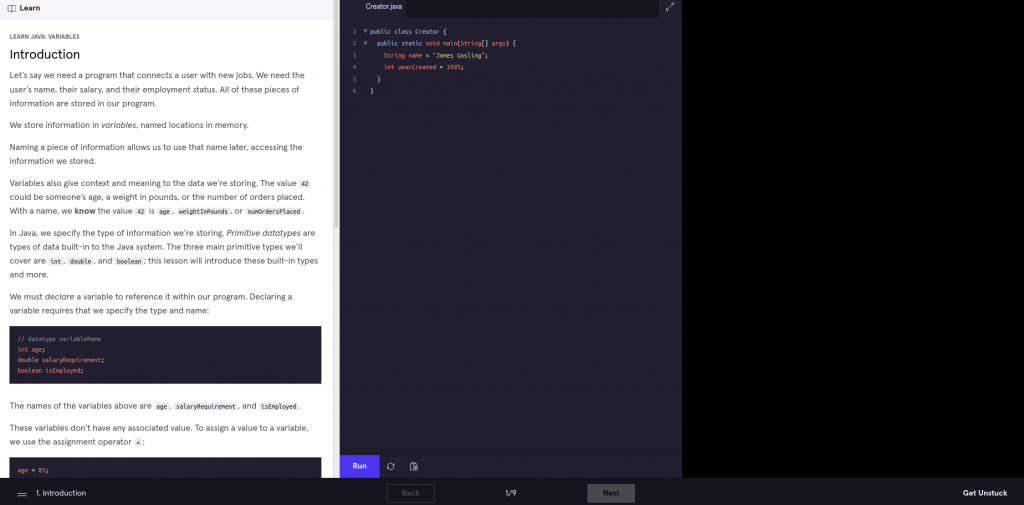
Codecademy Pro is an interactive learning platform. So you’ll do all work inside the same browser with the embedded code editor.
However, there are occasional videos to introduce new topics and to clarify concepts.
Projects
You’ll work on a total of 7 mini-projects throughout the Learn Java course.
Community
Codecademy Pro has a community where you can interact with other students to get help, share projects, and more.
💰 Price: $39.99 per month / $239.88 per year ($19.99/mo) for access to all courses and learning paths
⏲️ Duration: 25 hours
📉 Level: Beginner
🖥️ Format: Interactive learning and video
🎖️ Certificate: Yes
Modern Java: The Big Picture: Pluralsight
Modern Java: The Big Picture will give you a general overview of the Java programming language.
This is a good starter course for learning Java. But it certainly shouldn’t be the only resource you use.
You’ll learn about the simpler aspects of Java like what Java code looks like. Then you’ll learn about how it runs.
Next you’ll explore the Java Development Kit (JDK) and determine when you should use Java.
Finally, you’ll discover popular Java libraries and tools used for development.
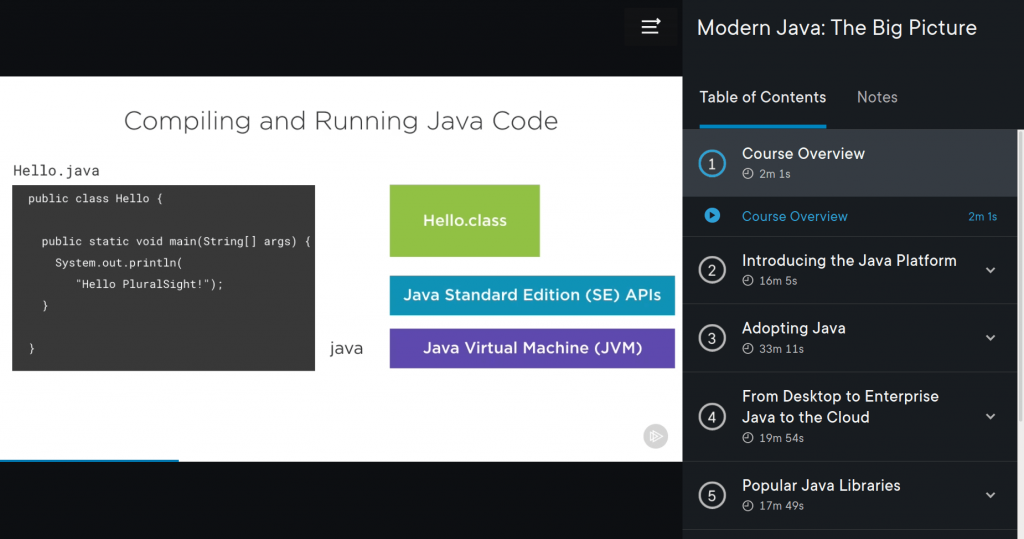
Pluralsight is a video-based learning platform. So that means you’ll be doing all work outside of the browser in your own developer environment.
Projects
There are no projects in Modern Java: The Big Picture.
Community
There is no official community on Pluralsight.
💰 Price: $29 per month / $299 per year ($24.92/mo) for access to all courses and learning paths
⏲️ Duration: 2 hours
📉 Level: Beginner
🖥️ Format: Video
🎖️ Certificate: Yes
Introduction to Java as a Second Language: Coursera
Introduction to Java as a Second Language is intended for students already familiar with another programming language.
The idea is that by being familiar with another programming language, you’ll pick up on Java concepts much faster.
The course is separated into 5 modules:
- Java Foundations
- Building the Java Development Environment
- Java Classes and Objects
- Instantiation, the Constructor, the Main Function and Objects
- Additional Classes and Concatenation
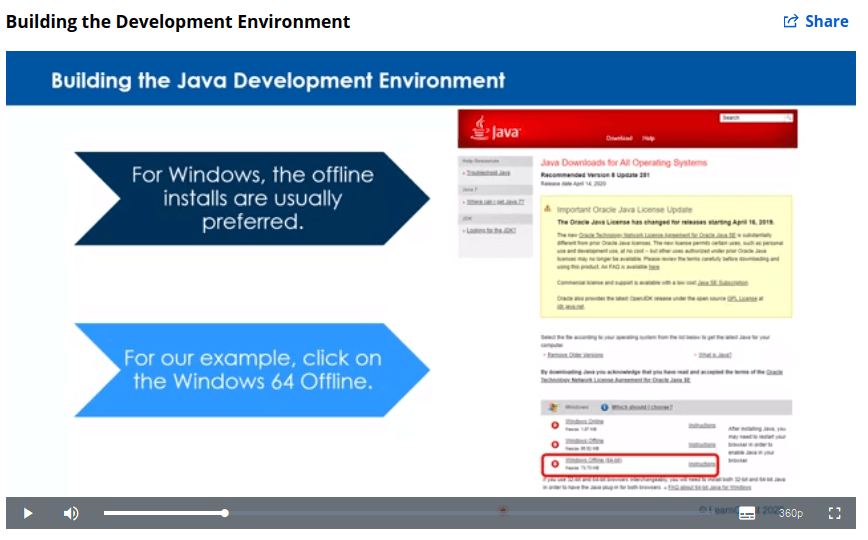
There are some lab exercises you’ll work on through your own dev environment, but the instructor will teach you how to set everything up.
Coursera is a video-based learning platform. However, there are readings and quizzes you’ll work on throughout Introduction to Java as a Second Language.
Projects
There aren’t any projects in this course.
Community
Coursera offers a community where students can connect with each other to get help.
💰 Price: $49 per month
⏲️ Duration: 7 hours
📉 Level: Intermediate
🖥️ Format: Video
🎖️ Certificate: Yes
Java for Programmers: Educative.io
Java for Programmers is a Learning Path on Educative.io. So instead of one course, it’s a combination of multiple courses.
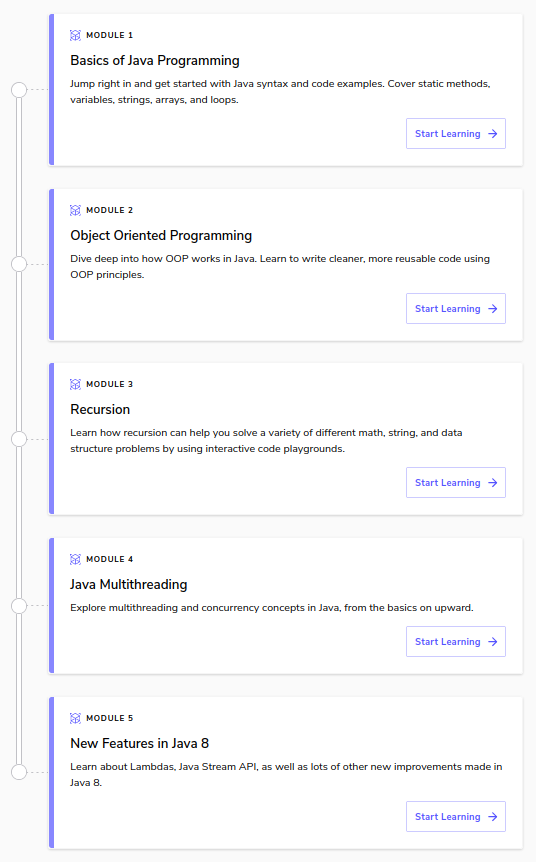
You can expect to spend several months working through the Java for Programmers Learning Path.
First you’ll get adapted to Java syntax. Then you’ll practice object-oriented programming techniques.
You’ll also learn about lambdas and Stream APIs.
Finally, you’ll master concurrency and use JUnit 5 to write unit tests.
Educative.io is an interactive learning platform. So there aren’t any videos.
Rather, you’ll work with coding playgrounds and exercises throughout the course to practice concepts.
Projects
There aren’t actual projects in Java for Programmers, but you’ll work through a series of exercises.
Community
Educative.io does not have an official community. Rather, you can get help from instructors and other students within the courses and Learning Paths.
💰 Price: $59 per month or $199 per year ($16.66 per month) for access to all courses and learning paths
⏲️ Duration: Unknown
📉 Level: Intermediate
🖥️ Format: Interactive learning
🎖️ Certificate: Yes
Java Basics: Treehouse
🚨 ALERT 🚨
As of September 2021, Treehouse has laid off 90% of its staff. The future of Treehouse is unknown.
Java Basics is another course that is ideal for code newbies.
First you’ll learn how to write programs in Java. Then you’ll explore how to interact with users while using the console.
After that, you’ll experiment with using basic data types so you can store and name data.
Finally, you’ll learn about conditions, looping and program flow.
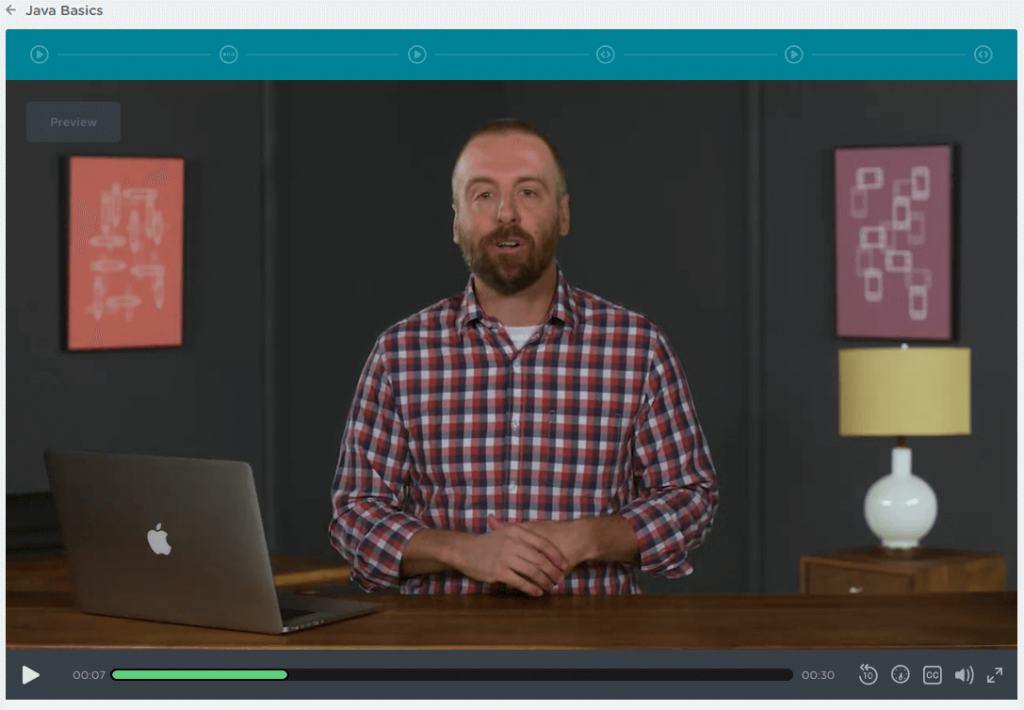
Treehouse is a video-based platform, so you’ll be doing most of your learning that way.
However, in Java Basics, you’ll also be working within the browser on various exercises. Plus you’ll take a few multiple choice quizzes.
Projects
You’ll build one project in Java Basics, an interactive game that generates a story using parts of sentences.
Community
Treehouse has a community board where you can post questions and interact with other students.
💰 Price: $29.99 per month / $239.88 ($19.99/mo) for access to all courses and tracks
⏲️ Duration: 2+ hours
📉 Level: Beginner
🖥️ Format: Video
🎖️ Certificate: No
💥 JAVA INTERVIEW COURSES
Ready to land that Java job? Check out these Java resources to help you pass the Java interview.
Decode the Coding Interview in Java: Educative.io
Decode the Coding Interview in Java is a new course on Educative.io.
Instead of just trolling through endless problems, you’ll develop the skills to dissect these problems and use the right tools to solve them.
And to do this, you’ll work on real-world problems faced at tech companies such as Netflix, Facebook and UBER.
You’ll also work on some games like Scrabble 2.0 and a card game.
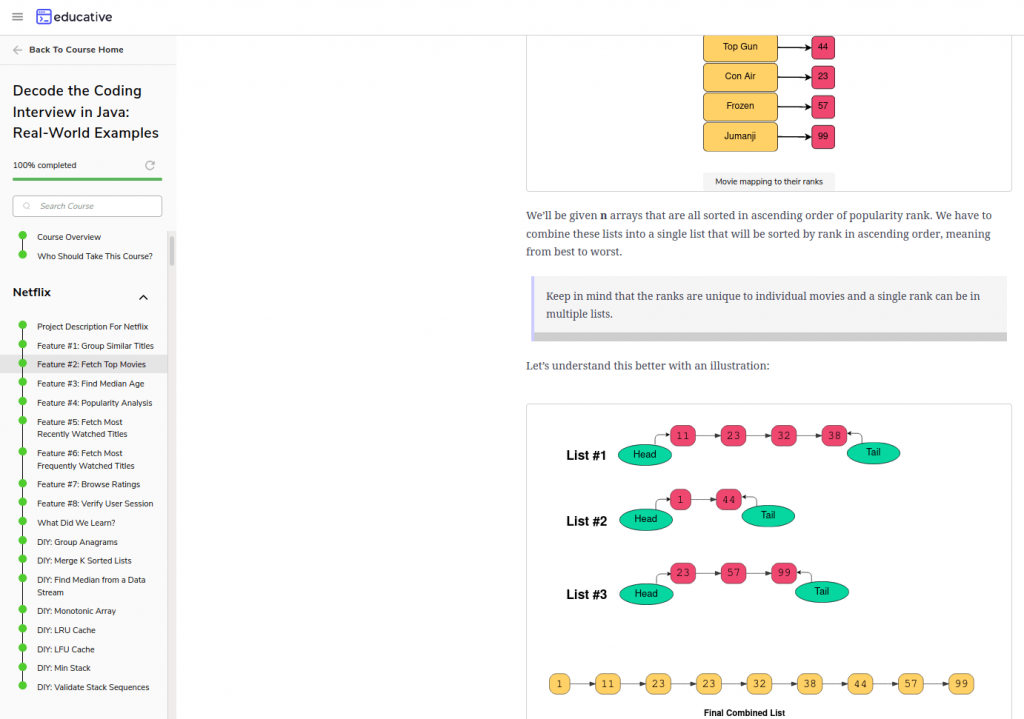
Educative.io is an interactive learning platform where you’ll work on all problems and exercises in the same browser using coding playgrounds and solving challenges.
There are no videos.
Projects
You’ll work on 19 projects in Decoding the Coding Interview in Java such as:
- Group Similar Titles
- Combine Similar Messages
- Design Search Autocomplete System
- Schedule a New Meeting
- Suggest Items for Special Offer
And many more.
Community
Educative does not offer a community board at this time. However, you can get help from instructors and other students within each course.
💰 Price: $79 per year for course / $59 per month or $199 per year ($16.66 per month) for access to all courses and learning paths
⏲️ Duration: 18 hours
📉 Level: Beginner
🖥️ Format: Interactive learning
🎖️ Certificate: Yes
Technical Interview Practice with Java: Codecademy
The idea with Technical Interview Practice with Java is that you’ll see the same types of interview questions at technical interviews.
There are three modules in Technical Interview Practice with Java:
- Algorithmic Complexity
- Technical Interview Skills
- Java Interview Problems
So after learning how to approach problems, you’ll work on Java data structures and algorithms problems similar to what you’ll see at actual coding interviews.
These problems will help you write cleaner, more efficient code.
Codecademy is an interactive learning platform. So you’ll do all work within the same browsers.
Projects
There are no projects in Technical Interview Practice with Java.
Community
Codecademy Pro has a community where you can get help from other students, share projects and more.
💰 Price: $39.99 per month / $239.88 per year ($19.99/mo) for access to all courses and learning paths
⏲️ Duration: 3 hours
📉 Level: Intermediate
🖥️ Format: Interactive learning and video
🎖️ Certificate: Yes
Pass the Technical Interview with Java: Codecademy
Pass the Technical Interview with Java is a Skill Path. So instead of taking one course, you’ll work on multiple which take several months to complete.
You’ll start by improving your coding skills. Then you’ll learn about tips and tricks to pass the coding interview.
There are 8 modules in Pass the Technical Interview with Java including:
- linear data structures
- hash maps
- algorithmic concepts
- graph data structures
And beyond.
Projects
You’ll work on mini projects throughout the skill path.
Community
Codecademy Pro has a thriving community where you can get help from other students, share projects and beyond.
💰 Price: $39.99 per month / $239.88 per year ($19.99/mo) for access to all courses and learning paths
⏲️ Duration: Unknown
📉 Level: Intermediate
🖥️ Format: Interactive learning and video
🎖️ Certificate: Yes
💥 JAVA BOOKS
These books are some of the best Java resources for beginners and experienced developers.
Head First Java, 2nd Edition
Head First Java by Kathy Sierra and Bert Bates is a bit of an older book (2009), but the major takeaways are still relevant today.
And the learning style can’t be beat. Instead of walls of mind-numbing text, you’ll learn with image-rich lessons, puzzles and tons of notes.
With Head First Java, you’ll get a complete introduction to object-oriented programming in Java.
In addition, you’ll learn about Java fundamentals and advanced topics such as:
- threads
- network sockets
- distributed programming with RMI
And beyond.
This edition of Head First Java focuses on Java 5.
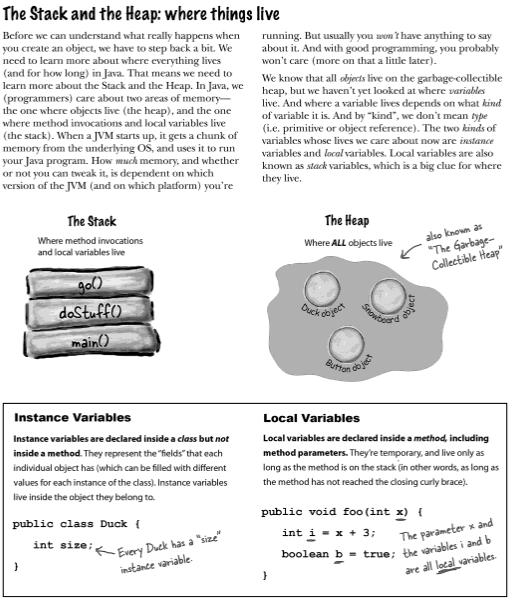
Java: The Complete Reference
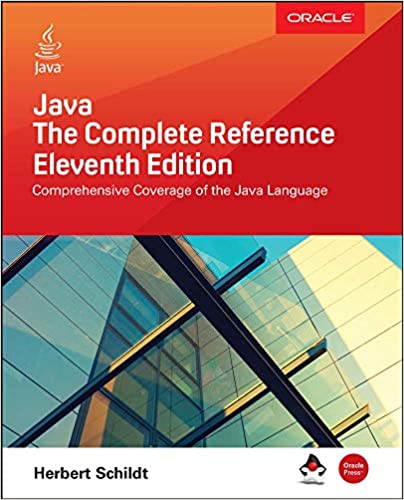
Java: The Complete Reference by Herbert Schildt features Java 11 and shows you how to develop, compile, debug and run Java. It covers all aspects of the Java programming language including syntax, keywords and programming principles.
In addition, you’ll learn about the Java API library. You’ll also explore Java’s interactive programming tool JShell.
Some more of what you’ll learn includes:
- data types
- control statements
- inheritance
- generics
- event handling
- Swing
And much, much more.
In addition to the book curriculum, there are code examples available for download.
Just getting started with Java? Check out another book by Oracle Press… Java: A Beginner’s Guide.
Learn Java: A Crash Course Guide to Learn Java in 1 Week
Learn Java: A Crash Course Guide to Learn Java in 1 Week by Timothy Needham makes some pretty strong claims. And while you can learn Java in 1 week, it all depends on your learning pace and how much time you’re willing to dedicate to learning Java.
And keep in mind that this will teach you Java fundamentals. But it won’t give you a complete Java education.
So this can be a good starting point, but we do recommend continuing to learn with other Java resources.
Some of what you’ll learn includes:
- Java fundamentals
- using methods to design and write procedural programs
- using loops to perform repetitive tasks
- object-oriented programming
And beyond.
You’ll also learn about variables, loops, arrays and conditional statements.
Think Java: How to Think Like a Computer Scientist
Think Java by Allen Downey and Christ Mayfield is an introduction to computer science used in high schools and universities worldwide. It takes an informal approach to teaching both basic and advanced programming concepts.
Each chapter presents itself as a week’s worth of a college course, and it includes plenty of exercises to reinforce concepts.
Some of what you’ll learn includes decisions and loops, classes and methods, and more. Then you’ll learn about strings and arrays, recursion and polymorphism.
In addition to learning the fundamentals, you’ll learn how to:
- formulate problems
- creatively solve problems
- develop, test, and debug programs
And more.
Learn Java 12 Programming
Learn Java 12 Programming by Nick Samoylov is meant to help readers understand major concepts such as object-oriented, functional and reactive programming.
While working with the latest features in Java 10, 11 and 12, you’ll look at programming topics like GUI programming, error handling and concurrency.
You’ll also learn best practices for writing Java code. In addition, you’ll examine how data structures are used in Java.
Then you’ll learn how streams are used in data processing, and you’ll explore microservices and how they make your apps scalable.
While Learn Java 12 Programming is geared towards beginners with no programming experience, there’s also plenty to be learned by professional programmers.
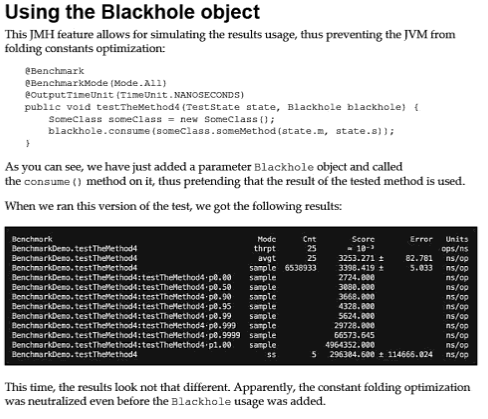
Thinking in Java, 4th Edition
Thinking in Java by Bruce Eckel is an older book (2006), but many of its practices are still relevant to modern Java programming. You’ll be learning Java 6, so take what you can use.
Geared towards beginners, you’ll be introduced to object-oriented programming in Java.
With a step-by-step process, you’ll learn how to solve problems and, more importantly, why you’re doing what you’re doing.
You’ll start by learning the basics of Java such as objects. Then you’ll learn about other fundamentals such as:
- program flow
- initialization
- implementation
- reusing classes
- polymorphism
And beyond.
Then you’ll learn about things like exception handling and run-time type identification.
You’ll also learn about server-side Java concepts like servlets and database integration.
Finally you’ll learn about the Swing GUI libraries.
Beginning Java Programming: The Object-Oriented Approach
Beginning Java Programming by Bart Baesens, et al. is meant to be a comprehensive Java guide with step-by-step instructions, case studies and exercises. You’ll start with the basics of Java and gradually work your way up to more advanced concepts.
First you’ll set up your integrated development environment (IDE) so you can apply what you’ve learned in real time. You’ll also work on plenty of sample programs.
Then you’ll learn about object-oriented programming and how to streamline your work flow with object-oriented patterns.
Finally, you’ll learn how to make applications accessible to GUI users.
Every chapter in Java Programming focuses on real-world business scenarios. And in the final chapter, there are multiple case studies.
Java in a Nutshell: A Desktop Quick Reference
Java in a Nutshell by Benjamin Evans and David Flanagan is for both new and experienced Java programmers. But if you’re a newbie, we don’t recommend using this as your only Java reference.
It covers Java 9, 10 and 11, and is filled with examples and development best practices.
The first part of the book is an introduction to Java programming. And the second part of the book is a reference for core Java concepts and APIs.
Using basic Java syntax, you’ll learn about object-oriented programming. You’ll also examine:
- concurrency
- memory
- lambda expressions
- enumerations
- generics
And beyond.
You’ll also become familiar with OpenJDK and the development tools it has to offer.
💥 JAVA INTERVIEW BOOKS
Got a Java interview coming up? Check out these Java resources.
The Complete Coding Interview Guide in Java
The Complete Coding Interview Guide in Java by Anghel Leonard is one of the best Java resources for programmers preparing for their coding interview.
First, you’ll go through the non-technical aspects of interviews.
Then you’ll work on over 200 interview problems and solutions you can expect to see at actual Java interviews. So you’ll work on problems related to object-oriented programming, time complexity and recursion.
And with step-by-step solutions, you’ll learn how to write better code at your Java coding interview.
Questions cover Java concepts like:
- arrays
- strings
- sorting
- searching
And beyond.
Then you’ll work on more complicated Java concepts such as concurrency, functionality and scalability.
You should have a firm grasp on high school math and programming in Java before reading this book.
Elements of Programming Interviews in Java
Elements of Programming Interviews in Java by Adnan Aziz, et al. is a collection of over 250 programming problems and solutions. These questions, or similar ones, are frequently asked at Java coding interviews.
But first, you’ll learn about non-technical aspects of the coding interview. This includes:
- strategies
- common mistakes
- negotiation tips
And more.
After that, you’ll move onto the coding problems which are separated by:
- data structures
- searching and sorting
- algorithm design principles
- concurrency
Every chapter contains a case study, tips, and library methods. Then you’ll work on a series of related problems.
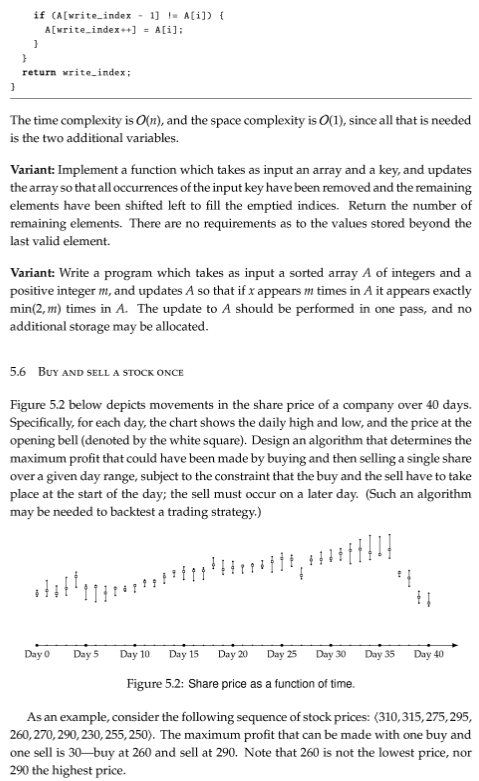
💥 BLOGS
Read what others have to say about Java with these Java resources.
Oracle Blogs: The Java Source
Oracle is the parent company to Java. So this is the official Java blog.
Here is where you’ll learn about the latest updates and technologies related to Java.
While it is the official blog, there aren’t a ton of entries.
So if you want to read more than a few posts a year, you should also check out some other blogs.
Baeldung
Baeldung contains blog entries, guides, courses, and a newsletter related to Java. There’s also plenty of content on Spring, a Java application framework.
You’ll also find guides and entries on REST, Jackson and JSON.
Javarevisited
Javarevisited is a thriving blog by Javin Paul. It’s updated daily, and sometimes multiple times a day.
It covers everything from core Java to:
- Spring
- interview questions
- object-oriented programming
- certifications
- Java XML
And much more.
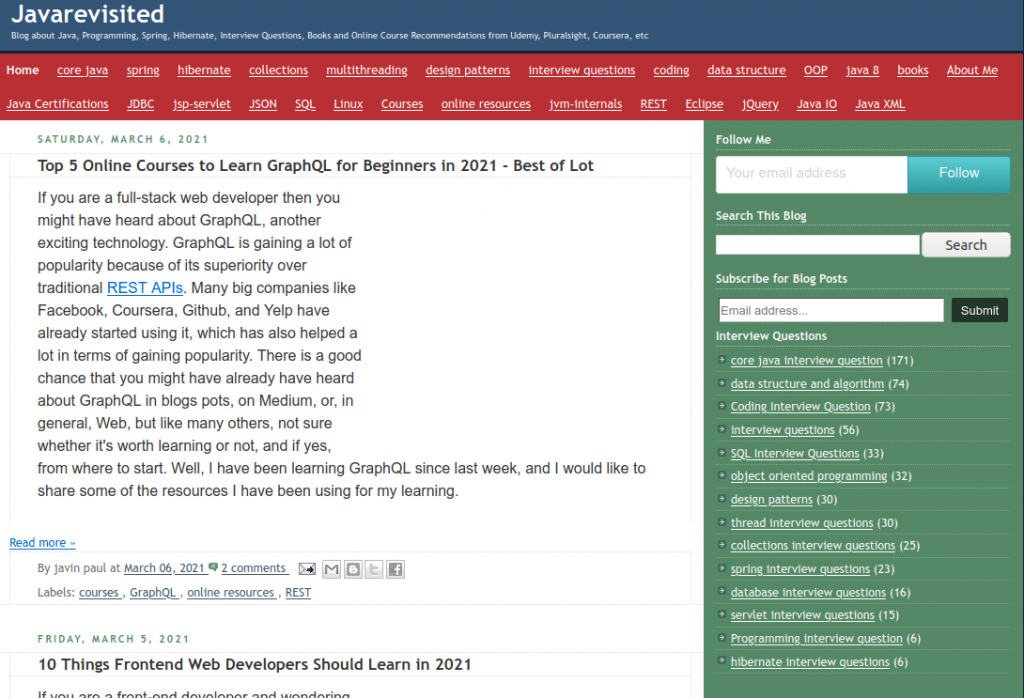
Coderanch
Coderanch is more of a forum than a blog, and it’s very active.
Some of the topics include:
- Java in General
- Lambdas and Streams
- Servlets
- Swing/AWT/SWT
- Other JSE/JEE APIs
- Distributed Java
And much, much more.
You can view posts based on most popular or most recent.
Spring Blog
Spring Blog is the official blog of the Spring application framework.
In this regularly updated blog, you’ll find blog posts on Spring tips, updates, announcements and more.
Most notable is their lengthy weekly update. Here you’ll learn about various Spring products like Boot, Cloud, Batch and more.
The Server Side
The Server Side is another regularly updated Java blog. Here is where you’ll learn about all things backend Java.
This includes posts on things like tutorials on Gitflow init, installing the Java Mission Control 8 Eclipse plugin, and more.
You’ll also look at some more common posts that examine things like Java recursion and iteration.
DZone: Java Zone
DZone: Java Zone is one of the best Java resources out there.
While you’ll see some more obscure articles like Transitional Effects of Scala, you’ll also find plenty of posts on common Java topics like constants and inference.
There’s a healthy blend of beginner and intermediate topics for almost any Java developer.
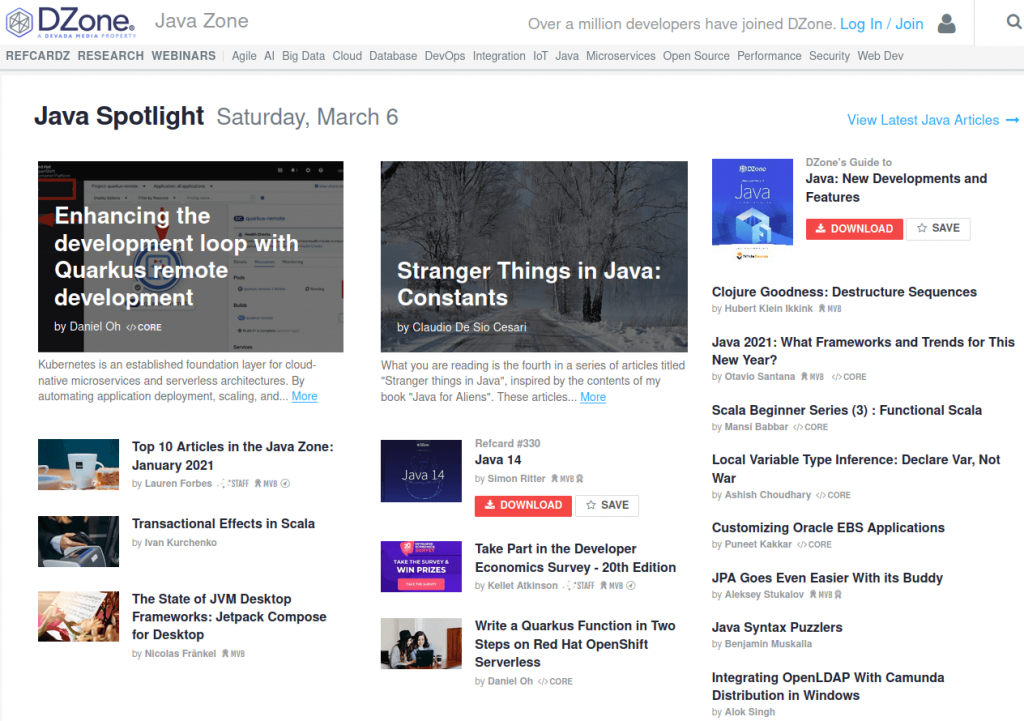
JavaWorld
JavaWorld strives to keep you up-to-date on the latest Java news and features. They also offer how-tos, reviews and videos.
You’ll find everything from learning React to getting hired as an entry-level programmer.
A Java Geek
A Java Geek is Nicolas Fränkel’s blog on all things Java. This regularly updated blog features all sorts of articles for the more experienced Java developer.
You’ll read about things like Optional.stream(), Tornado FX and the state of JVM desktop frameworks.
A Java Geek is not for inexperienced programmers.
Java Code Geeks
Java Code Geeks is one of the best Java resources we’re showing you today.
You see, they’ve got some great blog posts like:
- 150 Java Interview Questions and Answers
- 100 Spring Interview Questions and Answers
- JPA Tutorial
- MySQL vs. MongoDB
- Android Game Development Tutorials
And much more.
Instead of opinionated shorts, their posts are jam-packed with useful, relevant information that will help advance you as a Java user.
InfoQ
InfoQ is more of a list of Java resources.
So rather than read their own blog, they’ll recommend several others to you.
They also introduce you to Java guides, articles, podcasts and news.
But take note of the publication dates. Not all of them are as recent as you may want them to be.
💥 PODCASTS
Podcasts can be excellent Java resources.
Listen to others talk about Java.
Inside Java
Inside Java is one of the best Java resources for developers who like to go straight to the source.
This podcast is brought to you by people that actually develop Java at Oracle.
They talk about all things Java like the JVM, OpenJDK, projects and much more.
Java Off-Heap
Java Off-Heap is a podcast that was started by four friends who love talking about Java news and technologies. Because of their differing perspectives, they decided to take their discussion to the public.
They also bring on plenty of guests to talk about all things Java.
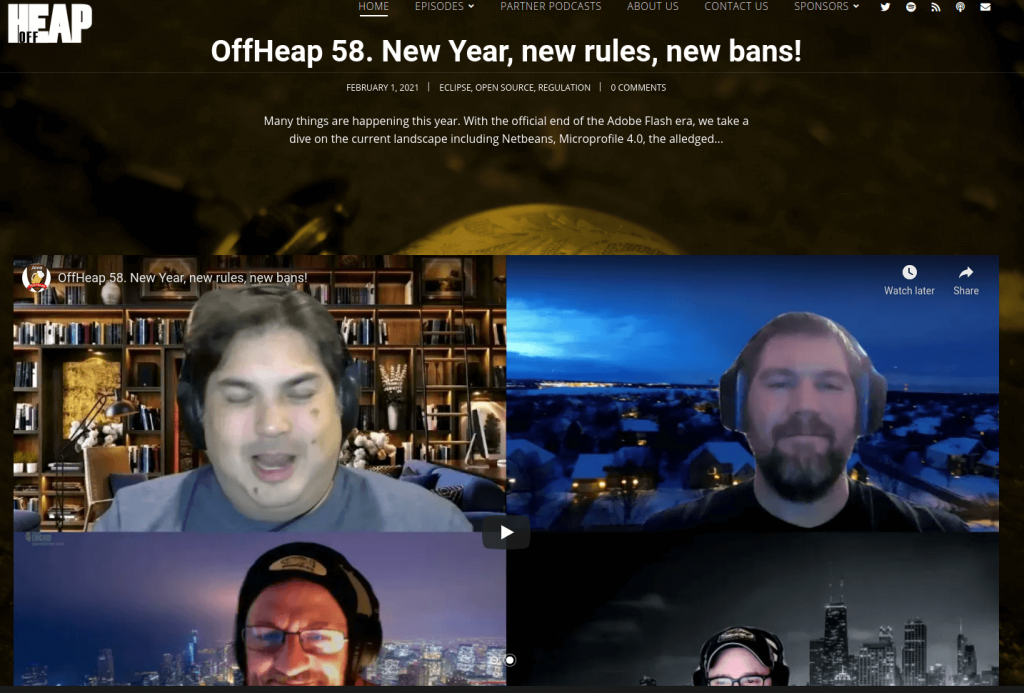
Java Pub House
The Java Pub House podcast comes from two of the creators of Java Off-Heap. It was created after the founders couldn’t find podcasts that dealt with actual problems Java developers face while on the job.
Their goal is to tackle issues on production software.
Hosts Freddy and Bob have over 40 years of software experience between them.
airhacks.fm
airhacks.fm covers mostly Java-related content. However, you will find some podcasts related to things like CSS and JavaScript.
But mostly, you’ll be listening to discussions on Java, Java EE, Jarkarta EE, MicroProfile and more.
Illegal Argument
Illegal Argument is a podcast by 3 Java enthusiasts. Podcasts come out a few times a year and typically last one to two hours.
They discuss everything from broken user interfaces to the joy of writing in Java.
💥 NEWSLETTERS
Newsletters are some of the best Java resources. Stay in the know with the latest Java news, updates, and more.
The JavaSpecialists’ Newsletter
The JavaSpcialists’ Newsletter has been in publication for over 20 years and has a mailing list of over 70,000 people.
The newsletter comes out roughly once a month. In addition to Java-specific topics, they send out puzzles with different solutions.
Baeldung
In addition to guides, blogs and courses, Baeldung offers a weekly newsletter on all things Java.
The newsletter contains curated news and articles to save you time and improve your coding game.
JavaWorld
The JavaWorld newsletter offers the latest:
- trends
- tutorials
- tips
- news
And everything else related to Java.
Awesome Java
Awesome Java is a weekly newsletter featuring Java news, articles and libraries.
Newsletters come out every Friday.
💥 YOUTUBE
Looking for a Java course or tutorial on YouTube? We picked some of the best Java resources for you.
Java Tutorial for Beginners: Programming with Mosh
Java Tutorial for Beginners is one of many tutorials by well-known YouTuber Mosh.
Geared towards beginners, this tutorial assumes you have no prior programming knowledge.
You’ll start by setting up your dev environment. Then you’ll learn about:
- Java basics
- how to execute Java code
- how to build simple algorithms
And from there, you’ll learn tips and tricks for writing clean, professional code.
By the end of the course, you’ll be ready to level up and learn more difficult concepts in Java.
Intro to Java Programming – Course for Absolute Beginners: freeCodeCamp
Intro to Java Programming – Course for Absolute Beginners is by the popular programming platform freeCodeCamp.
This course is geared towards absolute code newbies. You’ll start by learning how to set up your code environment. Then you’ll learn some basic Java concepts.
As the course progresses, you’ll work on some more advanced topics.
You’re encouraged to work in your own dev environment alongside the video.
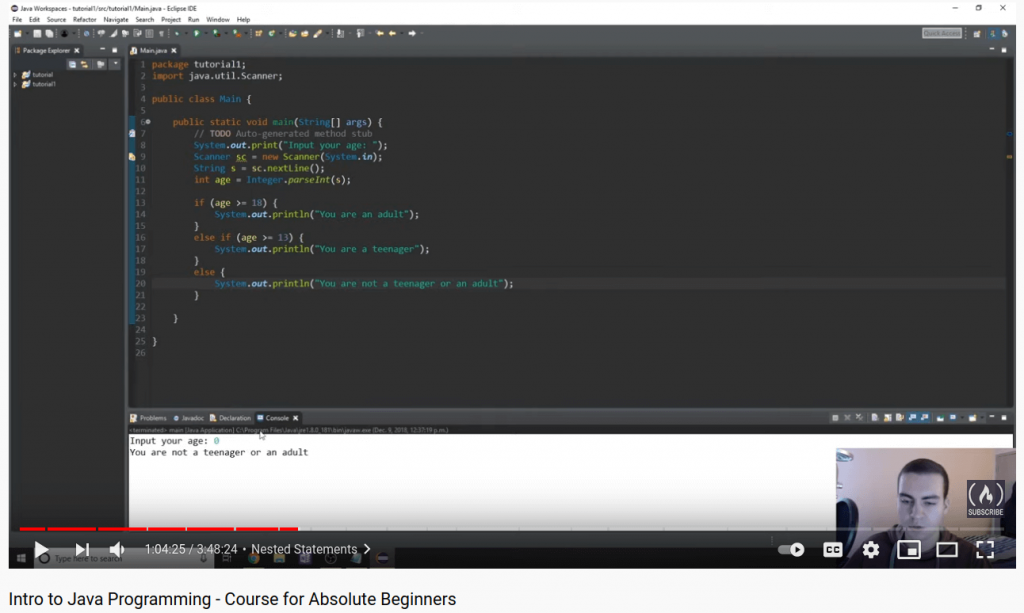
Java Full Course | Java Tutorial for Beginners: Amigoscode
This Java Full Course Tutorial for Beginners is by the well-known YouTuber Amigoscode.
This 4-hour course was created to help you grasp the core concepts of Java programming. It’s geared towards code newbies.
Amigoscode encourages you to code along as you learn new concepts.
By the end of the course, you’ll be able to build basic Java applications.
Amigoscode also has a private community where you can get answers to questions from Amigoscode as well as other students.
Java Programming All-in-One Tutorial Series: Caleb Curry
Java Programming All-in-One Tutorial Series by Caleb Curry is one of the best Java resources.
Caleb explains things in an easy-to-digest, understandable way.
It’s geared towards programming newbies.
In addition to Java fundamentals, you’ll learn about how and why Java performs the way it does. By the end of the tutorial, you should be able to write simple Java applications.
And instead of sitting back and watching the video, Caleb encourages you to work on the exercises in the tutorial.
💥 MISCELLANEOUS JAVA RESOURCES
RealToughCandy Discord
Want to chat with other Java developers?
RealToughCandy’s Discord server is a great place to meet other devs of all abilities from newbie to advanced. The Discord isn’t exclusive to Java, but you’ll find plenty of Java programmers.
It’s a space to network, share projects, get advice, and much more.
As a result, we think it’s one of the best Java resources.
BEST JAVA RESOURCES: CONCLUSION
Today we looked at some of the best Java resources available.
This includes courses, books, podcasts, newsletters and beyond.
So no matter what you’re looking for, we’re think we’ve found the best Java resources for most developers.
Up Next:
- Failed Coding Interview? [18 Best Coding Interview Resources for Bouncing Back]
- Best Book for Google Interview Preparation [Top 10 FAANG Interview Books]
- 13 Best Java Books for Beginners [Learn Java Programming]
- 16 Best Linux Books This Year [Linux for Beginners & Beyond]
- 14 Best Python Books for Beginners [Learn Python Programming]
What are the best Java resources?
The best Java resources include books, courses, blogs, podcasts, newsletters and YouTube channels. For example, we think one of the best Java courses is Learn Java from Scratch on Educative.io. And we think of the best Java books is Head First Java.
What is the best book to learn Java?
We think the best book to learn Java is Head First Java. Instead of walls of mind-numbing text, you’ll learn with image-rich lessons, puzzles and tons of notes. With Head First Java, you’ll get a complete introduction to object-oriented programming in Java. In addition, you’ll learn about Java fundamentals and advanced topics.
What is the best course to learn Java?
We think one of the best courses to learn Java is Learn Java from Scratch on Educative.io. It’s geared towards code newbies, and will teach you the fundamentals of Java. Educative is an interactive learning platform where you’ll do all work inside the browser.
